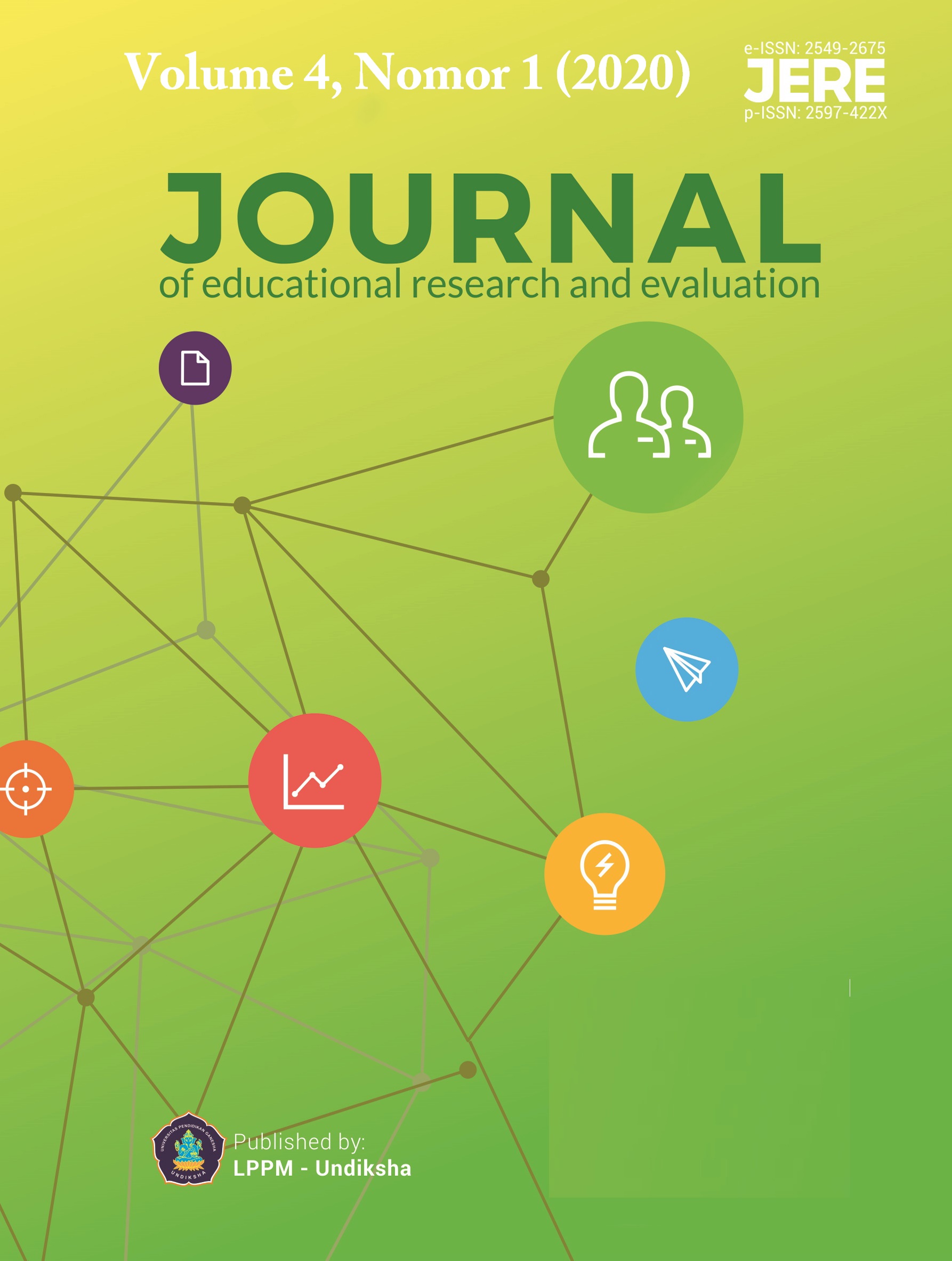Novice Versus Experienced Teachers: How They Transform Their Vulnerability Into Professional Identity in an Indonesian Junior High School
DOI:
https://doi.org/10.23887/jere.v4i1.23959Keywords:
education quality, vulnerability, professional identity construction, burn out, novice and experienced teachersAbstract
The quality of education is influenced by many factors, one of which is the quality of the teachers. In the spirit of fostering a strong and resilient young generation, teachers in the capital city of Nusa Tenggara Timur (NTT), Kupang, attempted to break through their limitations in order to form their identity. This research investigated how novice and experienced teachers shifted their vulnerability into professional identity and to what extent this strategy impacted on their professional identity construction in a Junior High School in Kupang. This research presented a thematic analysis on their expectation and anxiety, their strategies and how these strategies helped them to build their identity. Results from data analysis clearly indicated that without critical reflections and actions, both novice and experienced teachers could undergo burnt out when dealing with their vulnerability.
References
Alsup, J. (2018). Teacher Identity Discourse as Identity Growth: Stories of Authority and Vulnerability. In P. A. Schutz, J. Hong, & D. C. Francis (Eds.), Research on teacher identity (13–23). https://doi.org/https://doi.org/10.1007/978-3-319-93836-3
Ball, S. J. (2003). The teacher’s soul and the terrors of performativity. Journal of Education Policy, 18(2), 215–228. https://doi.org/10.1080/0268093022000043065
Creswell, J. (2014). Research Design: Qualitative, Quantitative, and Mixed Methods Approaches (4th ed.). Sage Publication, Inc.
Day, C. (2018). Professional identity matters: Agency, emotions, and resilience. Research on Teacher Identity: Mapping Challenges and Innovations, (1), 61–70. https://doi.org/10.1007/978-3-319-93836-3_6
Dimitrieska, V. (2018). Becoming a Language Teacher: Tracing the Mediation and InternalizationProcesses of Pre-service Teachers. Research on Teacher Identity: Mapping Challenges and Innovations, (1), 157–168. https://doi.org/10.1007/978-3-319-93836-3_14
Friesen, M. D., & Besley, S. C. (2013). Teacher identity development in the first year of teacher education: A developmental and social psychological perspective. Teaching and Teacher Education, 36, 23–32. https://doi.org/10.1016/j.tate.2013.06.005
Hamman, D., Gosselin, K., Romano, J., & Bunuan, R. (2010). Using possible-selves theory to understand the identity development of new teachers. Teaching and Teacher Education, 26(7), 1349–1361. https://doi.org/10.1016/j.tate.2010.03.005
Harman, Benny. (2017). Mendikbud dan cara melihat pendidikan di NTT. Retrieved from https://nasional.kompas.com/read/2017/12/13/08472011/mendikbud-dan-cara-melihat-pendidikan-di-ntt?page=2
Harrison, J. K., & Lee, R. (2011). Exploring the use of critical incident analysis and the professional learning conversation in an initial teacher education programme. Journal of Education for Teaching, 37(2), 199–217. https://doi.org/10.1080/02607476.2011.558285
Jun, Y. dan, Issa, Feng, H. ai, & Zheng Zhi Lian. (2018). Telling Stories: Understanding Teachers’ Identity in a Context of Curriculum Innovation. In O. Kwo (Ed.), Teachers as Learners (45–64). https://doi.org/10.1017/cbo9780511841057.010
Kelchtermans, G. (2013). Who I am in how I teach is the message: Self-understanding vulnerability, and reflection. Advances in Research on Teaching, 19(April 2015), 379–401. https://doi.org/10.1108/S1479-3687(2013)0000019021
Kwo, O. (2018). From SET to STELT: Seeking the Meaning of Learning as a Community for Curriculum Development. In O. Kwo (Ed.), Teachers as Learners (26th ed., 153–176). https://doi.org/10.1017/cbo9780511841057.010
Lasky, S. (2005). A sociocultural approach to understanding teacher identity, agency and professional vulnerability in a context of secondary school reform. Teaching and Teacher Education, 21(8), 899–916. https://doi.org/10.1016/j.tate.2005.06.003
Liew, Warren Mark. (2018). From SET to STELT: Seeking the Meaning of Learning as a Community for Curriculum Development. In O. Kwo (Ed.), Lessons on Reform: A Story of Teaching as Lived Practise (245-268).
Miyagamwala, G. (2015). Emotional Intelligence and Teacher Effectiveness - An Analysis. The Business and Management Review, 5(4), 233–239.
Palmer, P. J. (2003). The Heart of a Teacher. In The Courage to Teach (9–33). https://doi.org/10.1080/00091389709602343
Pillen, M., Beijaard, D., & den Brok, P. (2013). Tensions in beginning teachers’ professional identity development, accompanying feelings and coping strategies. European Journal of Teacher Education, 36(3), 240–260. https://doi.org/10.1080/02619768.2012.696192
Seo, John. (2018). Menteri Muhadjir Effendy: Pendidikan di NTT urutan 3 terbawah. Retrieved from https://nasional.tempo.co/read/1048094/menteri-muhadjir-effendy-pendidikan-di-ntt-urutan-3-terbawah
Shimura, K. (2001). Compare and Contrast of Grounded Theory and KJ Method, (1965), 46–57.
Sloan, K. (2006). Teacher Identity and Agency in School Worlds: Beyond the All-Good/All-Bad Discourse on Accountability-Explicit Curriculum Policies. In Curriculum Inquiry (Vol. 2).
Song, J. (2016). Emotions and Language Teacher Identity: Conflicts, Vulnerability, and Transformation. TESOL Quarterly, 50(3), 631–654. https://doi.org/10.1002/tesq.312
Tao, J., & Gao, X. (2017). Teacher agency and identity commitment in curricular reform. Teaching and Teacher Education, 63, 346–355. https://doi.org/10.1016/j.tate.2017.01.010
Ulvik, M., & Langrgen, K. (2012). What can experienced teachers learn from newcomers? Newly qualified teachers as a resource in schools. Teachers and Teaching: Theory and Practice, 18(1), 43–57. https://doi.org/10.1080/13540602.2011.622553
van der Want, A. C., den Brok, P., Beijaard, D., Brekelmans, M., Claessens, L. C. A., & Pennings, H. J. M. (2018). Changes over time in teachers’ interpersonal role identity. Research Papers in Education, 33(3), 354–374. https://doi.org/10.1080/02671522.2017.1302501
Downloads
Published
How to Cite
Issue
Section
License
Authors who publish with the Journal of Evaluation and Research in Education (JERE) agree to the following terms:
- Authors retain copyright and grant the journal the right of first publication with the work simultaneously licensed under a Creative Commons Attribution License (CC BY-SA 4.0) that allows others to share the work with an acknowledgment of the work's authorship and initial publication in this journal.
- Authors are able to enter into separate, additional contractual arrangements for the non-exclusive distribution of the journal's published version of the work (e.g., post it to an institutional repository or publish it in a book), with an acknowledgment of its initial publication in this journal.
- Authors are permitted and encouraged to post their work online (e.g., in institutional repositories or on their website) prior to and during the submission process, as it can lead to productive exchanges, as well as earlier and greater citation of published work. (See The Effect of Open Access)











